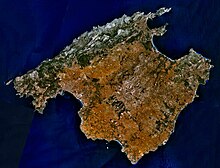
Mallorca (del latín insula maior, ‘isla mayor’, posteriormente Maiorica, en contraposición a Minorica o insula minor) es la isla más grande del archipiélago balear, la cual, junto a Menorca, Ibiza y Formentera, forma una comunidad autónoma uniprovincial, la más oriental de España.
La isla tiene 3640,11 km², lo que la convierte en la isla más extensa de España y la sexta más extensa del Mediterráneo. Sus &&&&&&&&&0859289.&&&&&0859 289 habitantes (INE 2015) la hace la isla más poblada del archipiélago balear y la segunda isla más poblada de España tras Tenerife. Mallorca posee una densidad de población...